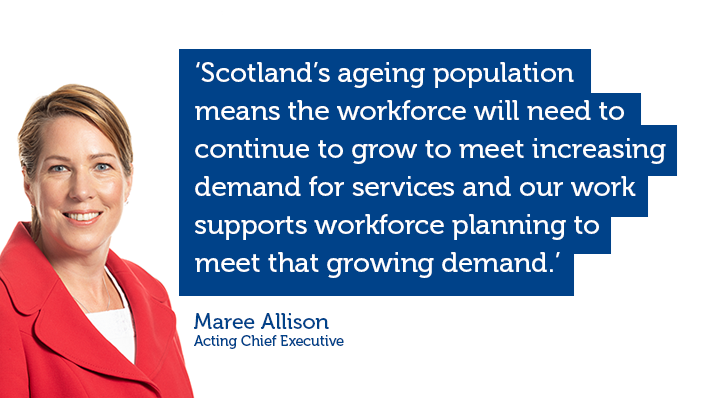The Scottish Social Service Sector: Report on 2022 Workforce Data report, published by the Scottish Social Services Council (SSSC), shows the workforce makes up around 8% of all Scottish employment or one in 13 jobs.
The report shows the biggest workforce increases were in housing support/ care at home and day care of children services and nurse agencies. This reflects the move towards more care being provided in people’s own homes and the expansion of free early learning and childcare.
A valued workforce
SSSC Acting Chief Executive, Maree Allison said: ‘As Scotland’s social work, social care and children and young people workforce continues to grow it’s a good time to recognise the valuable contribution they make helping people live the lives they want but also their contribution to the economy .
‘Representing one in 13 of all Scottish jobs there are lots and varied job roles available working with children, young people, adults and older people and we are working with Scottish Government and other key partners to promote care as a career of choice.
‘Scotland’s ageing population means the workforce will need to continue to grow to meet increasing demand for services and our work supports workforce planning to meet that growing demand.
‘It’s important too that we advocate for fair work and support the wellbeing of the workforce to make sure the trusted, skilled and confident workforce is properly valued for the work they do.’
Key points from this year’s workforce data report
- The size of the workforce rose slightly to 211,510, an increase of 1.5% since 2021. The social service workforce makes up approximately 7.8% of all Scottish employment.
- This increase has been driven mainly by increases in the housing support/care at home, day care of children and nurse agency sub-sectors.
- The whole time equivalent (WTE) measure of the workforce is 160,960, an increase of 1.1% since 2021.
- The stability index of the workforce is 75.5%. This means just over three-quarters of the workforce remained in the same post from the previous year.
- The largest employer type differs between local authority areas, with services in Orkney, Shetland and Na h-Eileanan Siar (the three island authorities) provided mainly by the public sector. However, in most areas the private sector is the largest employer.
- The three largest sub-sectors are housing support/care at home, care homes for adults and day care of children; together these account for almost 79% of the workforce.
- The median age of the workforce is highest in the public sector (46) and lowest in the private sector (40). Staff working in early years services in the private sector have the lowest median age (28).
- The percentage of men working in the sector is 15%, although it is around double or greater that proportion in criminal justice social work and residential children’s services.
- The workforce is mainly employed on permanent contracts (83%).
- The median figure for the typical weekly hours worked by staff is 33 and 53% of the workforce work full time (more than 30 hours per week).
The report combines administrative data collected by the Care Inspectorate with data collected by the SSSC directly from local authorities to form a comprehensive picture of the paid workforce employed in the social service sector in Scotland at the end of 2022. The SSSC is an official statistics provider.
Download the Scottish Social Service Sector: Report on 2022 Workforce Data report here.
You can find more reports on our Workforce Data website.
